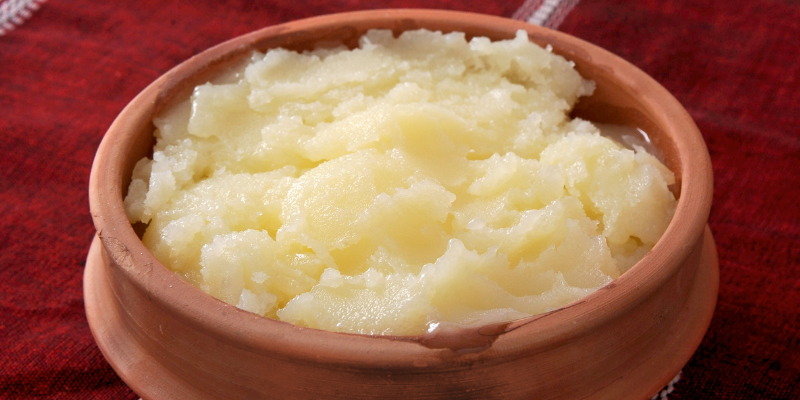A2 Bilona Ghee
Published on: June 21, 2025

🐄 What is A2 Ghee? And How It’s Different from Natural & Organic Ghee
In the world of traditional nutrition, **ghee** holds a special place. But today, terms like “A2 Ghee,” “Organic Ghee,” and “Natural Ghee” often confuse consumers. If all ghee is made from cow milk, what makes A2 ghee so unique? Why is it gaining popularity among health-conscious people and Ayurvedic followers?
Let’s break it down clearly.
🧬 What is A2 Ghee?
A2 Ghee is made from the milk of cows that produce only the A2 type of beta-casein protein. These are usually indigenous Indian cow breeds such as Gir, Sahiwal, Tharparkar, or Rathi. Their milk is naturally rich, easier to digest, and free from the A1 protein that many studies link with inflammation, bloating, and dairy sensitivity.
A2 ghee is typically made using the **Bilona method** – where curd is churned by hand or machine to make butter, which is then slowly heated to get ghee. This method preserves nutrients and creates a golden, aromatic ghee that’s easy on the stomach.
🌿 What is Natural or Organic Ghee?
Natural ghee usually refers to ghee made without synthetic additives, chemicals, or preservatives. It may come from cows raised on a natural diet, but **not all natural ghee is A2**.
Organic ghee is made from milk sourced from cows fed certified organic fodder and not treated with antibiotics or hormones. However, the breed of cow is not always disclosed, meaning it could be from a Jersey or Holstein cow that produces A1 milk.
🤔 If Natural Ghee is Good, Why Choose A2 Ghee?
- A2 ghee is free from A1 beta-casein, which many people find hard to digest.
- Made from desi Indian cows, which are genetically closer to ancient Vedic breeds.
- Rich in Omega-3, Vitamin A, CLA (Conjugated Linoleic Acid) – supports heart, joints, and metabolism.
- Highly recommended in Ayurveda for detox, immunity, and digestive balance.
- May reduce inflammation and lactose-related issues in dairy-sensitive individuals.
So, while natural and organic ghee is good, **A2 ghee goes a step further** with targeted health benefits and purity.
🆚 A2 Ghee vs Organic/Natural Ghee: Key Differences
| Feature | A2 Ghee | Natural/Organic Ghee |
|---|---|---|
| Milk Source | Desi cows (Gir, Sahiwal, etc.) | Any cow breed (including hybrid/Jersey) |
| Protein Type | A2 beta-casein | Usually a mix of A1 & A2 |
| Digestion | Easy to digest | May cause discomfort in some people |
| Health Benefits | Higher CLA, anti-inflammatory, Ayurvedic | Depends on source and method |
| Price | ₹1100 – ₹1600 per kg | ₹500 – ₹1000 per kg |
🔍 Pro Tip: Read the Label Carefully!
Many brands market their ghee as “Desi” or “Pure” without specifying the breed of cow or the protein type. If it doesn’t mention A2 milk and the breed (like Gir or Sahiwal), it’s likely not A2 ghee.
💛 Final Thoughts
A2 ghee is not just another food—it’s a return to ancient Indian wisdom. When you choose A2 ghee made using the Bilona method, you’re investing in better digestion, stronger immunity, and a more balanced life.
For families seeking purity, tradition, and long-term wellness, A2 ghee is clearly worth the investment over generic or even organic ghee.
🛒 Where to Buy A2 Ghee?
Premanand Food offers 100% authentic Bilona A2 Desi Ghee from grass-fed indigenous cows. Pure, hand-churned, and shipped across India.
#A2Ghee #BilonaGhee #NaturalWellness #PremanandFood #TraditionalHealth

